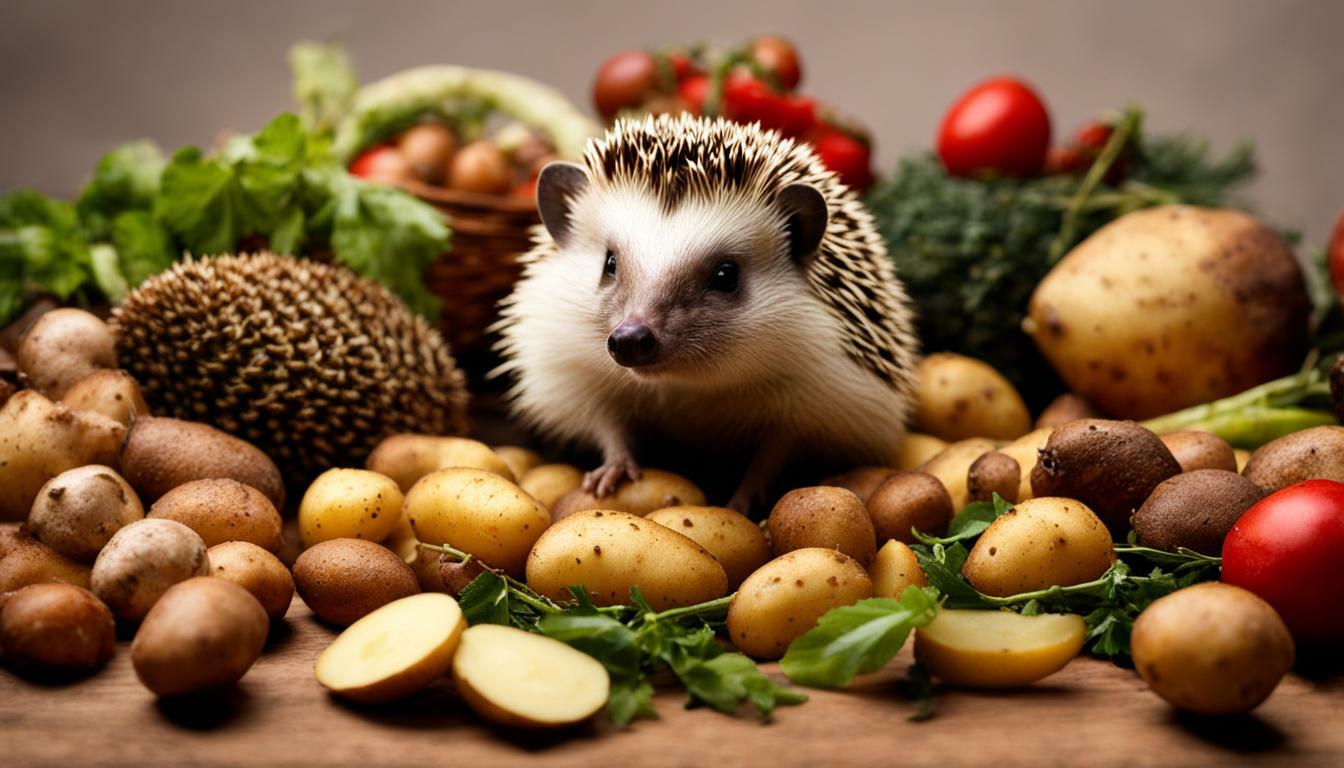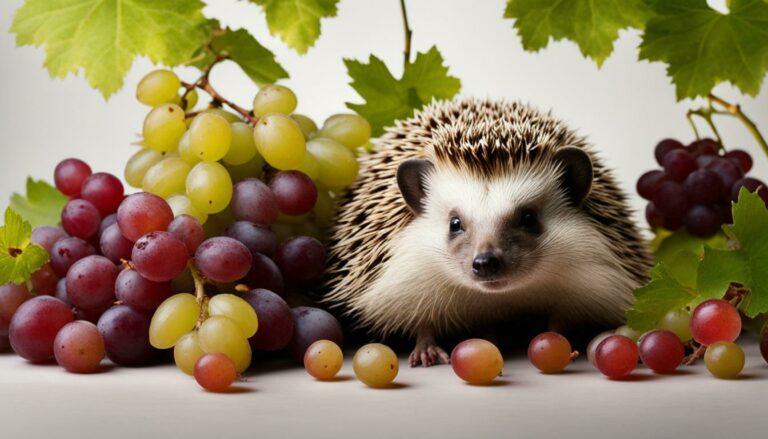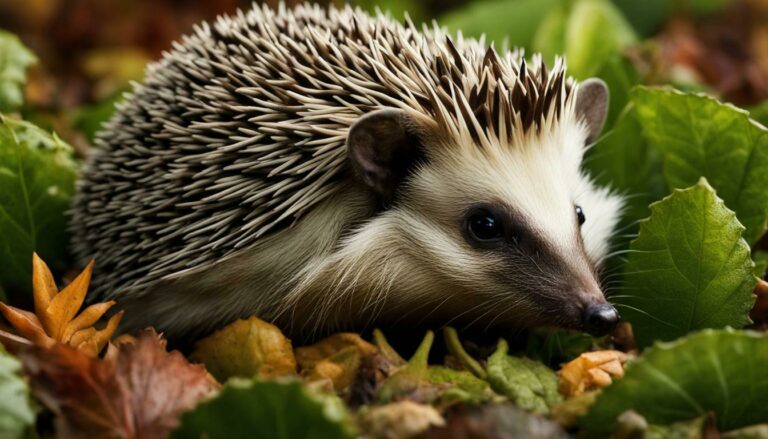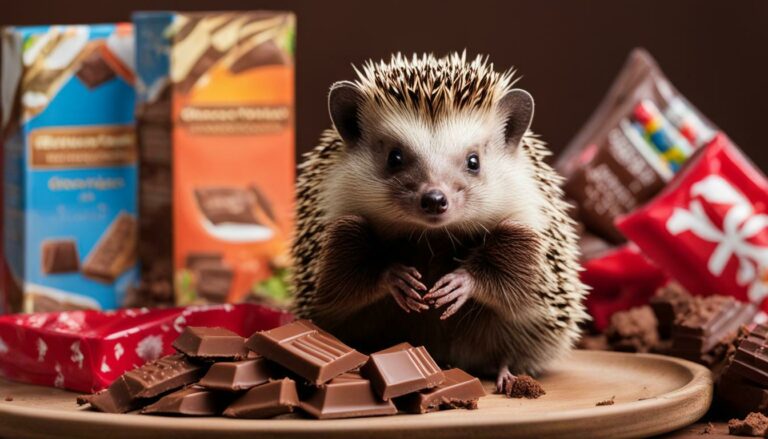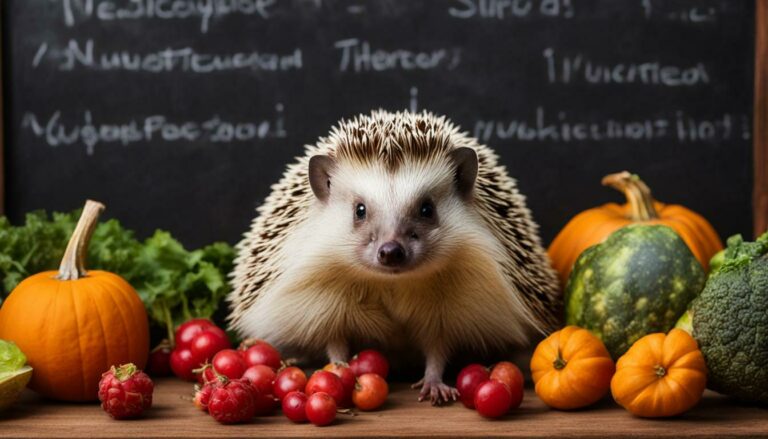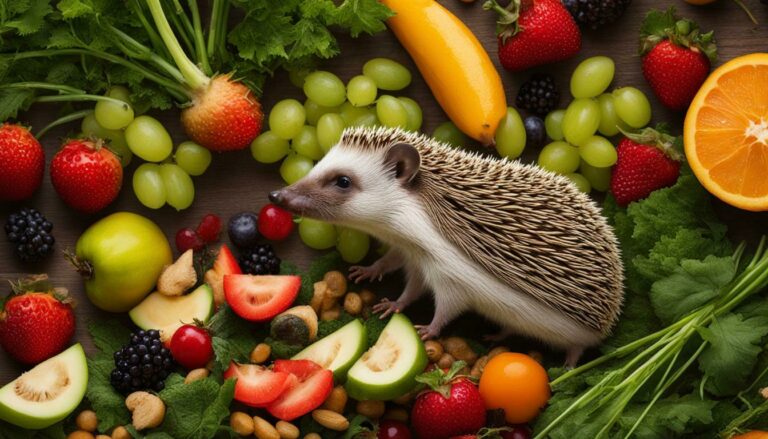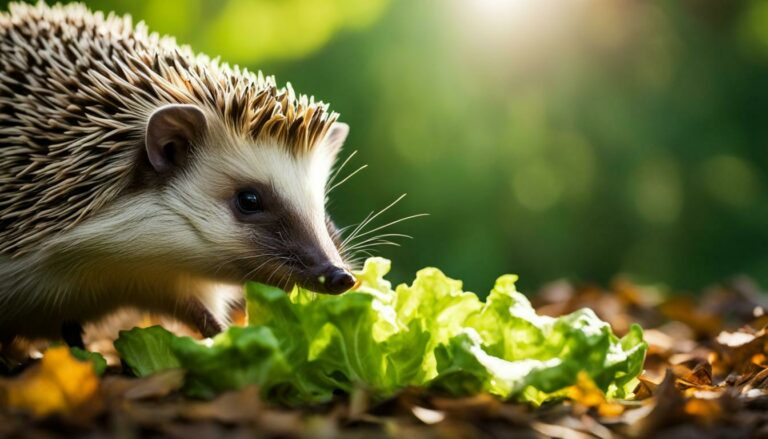Can Hedgehogs Eat Cooked Potatoes? The Fact-Checked Guide
Hedgehogs have specific dietary needs that must be met to ensure their health and well-being. One common question among hedgehog owners is whether it is safe for them to consume cooked potatoes. In this article, we will provide a fact-checked guide on hedgehog diets and explore whether cooked potatoes should be included in their food list.
Key Takeaways:
- Hedgehogs are considered omnivores or insectivores and have a varied diet in the wild.
- They require a balanced mix of proteins, fiber, and other essential nutrients.
- Safe foods for hedgehogs include live or freeze-dried insects, cat or hedgehog kibble, cooked chicken, scrambled eggs, and fresh fruits and vegetables in moderation.
- It is important to avoid feeding hedgehogs foods that are high in acidity, choking hazards, or contain harmful seasonings.
- Cooked potatoes should be approached with caution, and alternative food options may be preferred.
- Proper portion sizes and monitoring of hedgehog weight are crucial to prevent obesity.
Hedgehog Diet and Nutritional Requirements
Hedgehogs are considered either omnivores or insectivores, depending on the source referenced, but it is important to provide them with a balanced diet that includes a variety of foods. In the wild, hedgehogs eat a mixture of bugs, plants, and roots, but replicating this diet can be challenging in captivity. Therefore, it is crucial to ensure that pet hedgehogs receive the necessary nutrients from their food.
Commercial Hedgehog Food: Hedgehog-specific kibble is available, but it is important to check the ingredients and choose a high-quality brand. Look for a mixture of 2-3 different kinds of meat-rich, dry cat food with a fat content under 10%. Avoid formulas that contain fillers, raisins, and seeds.
Insects: Live feeder insects such as crickets, mealworms, and waxworms are a vital part of a hedgehog’s diet. They provide essential protein and mental stimulation for hedgehogs. Gut-loading the insects with fresh fruits and vegetables before feeding them to your hedgehog ensures they receive additional nutrition.
Fruits and Vegetables: While hedgehogs do not have a cecum to digest plant matter, offering a small amount of fresh fruit and vegetables as occasional treats can provide some extra variety. Popular options include apples, bananas, berries, tomatoes, green beans, and cooked squash. Avoid starchy vegetables like corn, potatoes, and carrots, as well as dried fruit.
Proteins: Cooked meat such as chicken and lean canned dog or cat food can be offered in small amounts to supplement a hedgehog’s protein intake. Cooked eggs, such as scrambled or hard-boiled eggs, are also a nutritious option packed with protein.
Water: Clean, fresh water should always be available for hedgehogs. Use a small bowl or consider a water bottle if your hedgehog prefers it.
| Food | Benefit |
|---|---|
| Commercial Hedgehog Food | A balanced source of essential nutrients |
| Insects | Provide protein and mental stimulation |
| Fruits and Vegetables | Offer occasional variety and treats |
| Proteins | Supplement the hedgehog’s protein intake |
It is important to monitor a hedgehog’s weight and adjust their portion sizes accordingly to prevent obesity. Each day, offer one to two tablespoons of commercial hedgehog kibble, along with a teaspoon of fruits and vegetables and some insects. Larger, more active hedgehogs may require more food, but any weight gain over 10% should prompt a reduction in food portions. Uneaten food should be discarded the next day to avoid spoilage, and fresh water should always be provided.
By providing a balanced diet that meets their specific nutritional requirements, hedgehogs can thrive and maintain good overall health.
Safe Foods for Hedgehogs
Hedgehogs can enjoy a variety of safe foods, including fresh fruits and vegetables, as well as certain proteins, but it is important to be aware of any foods that may be harmful to them, such as cooked potatoes. Providing a balanced diet is essential for the health and well-being of hedgehogs, as they have specific nutritional requirements.
When it comes to fruits, hedgehogs can be offered a small amount of fresh fruit as an occasional treat. Popular choices among hedgehogs include apples, bananas, berries, and melons. However, it is important to avoid dried fruits, as they can be high in sugar and may cause digestive issues.
Vegetables can also be included in a hedgehog’s diet. Fresh tomatoes, green beans, and cooked squash are some options that hedgehogs may enjoy. However, starchy vegetables like corn, potatoes, and carrots should be avoided, as they can be difficult for hedgehogs to digest. Additionally, dried vegetables should not be fed to hedgehogs.
| Safe Fruits | Safe Vegetables | Safe Proteins |
|---|---|---|
| Apples | Tomatoes | High-protein, low-fat canned dog or cat food |
| Bananas | Green beans | Cooked chicken |
| Berries | Cooked squash | Cooked eggs |
| Melons | – | Pinky mice (occasional treat) |
Proteins are an important part of a hedgehog’s diet. High-protein, low-fat canned dog or cat food can be offered in small amounts. Cooked chicken is another protein option that can be offered to hedgehogs. An occasional bit of scrambled or hard-boiled egg is also a nice treat packed with protein. For those who are comfortable with it, pre-killed pinky mice can be offered as a treat.
It is important to note that hedgehogs need a balanced diet that includes a commercial hedgehog or cat kibble as the main component. This kibble should contain at least 30 percent protein and less than 20 percent fat. Hedgehog food is the ideal diet if it meets these nutritional requirements. However, some formulated diets may contain ingredients like raisins and seeds, which are not recommended for hedgehogs.
When feeding hedgehogs, it is crucial to monitor their weight to prevent obesity. An adult hedgehog should be offered one to two tablespoons of kibble per day, along with a teaspoon of fruits and vegetables and some insects. Larger and more active hedgehogs may require more food, but weight should be monitored to ensure they are not gaining too much. Any uneaten food should be disposed of the next day to avoid spoilage, and fresh water should always be available.
In Conclusion
Providing a safe and balanced diet is essential for the health and well-being of hedgehogs. While they can enjoy a variety of safe foods, it is important to avoid certain foods like cooked potatoes. By offering a combination of fresh fruits, vegetables, and proteins, along with a high-quality hedgehog or cat kibble, hedgehog owners can ensure that their pets receive the necessary nutrition to thrive.
The Digestive Ability of Hedgehogs
Hedgehogs have the unique ability to digest chitin from insects, which is an essential component of their diet, but they also require other nutrients from their food to thrive. Being opportunistic carnivores, hedgehogs in the wild consume a variety of foods, including bugs, plants, and roots. While they do not have a cecum to digest cellulose, hedgehogs can benefit from the nutritional value of fruits and vegetables if provided through the insects they consume.
When it comes to feeding hedgehogs, it is important to ensure a balanced diet that meets their nutritional needs. Live or freeze-dried insects like mealworms, waxworms, and crickets are a good source of chitin and provide mental stimulation for hedgehogs. Gut-loading the insects with fresh fruits and vegetables before offering them to hedgehogs enhances their nutritional value.
| Fruits | Vegetables | Proteins |
|---|---|---|
| Apples | Fresh tomatoes | Cooked chicken |
| Bananas | Fresh green beans | High protein, low-fat canned dog or cat food |
| Berries | Cooked squash | Cooked eggs |
| Melons | Pinky mice (occasional treat) |
The Role of Kibble in Hedgehog Diet
Hedgehog or cat kibble should form the bulk of a hedgehog’s diet, as it provides the necessary balance of protein, fat, and other nutrients. It is important to choose a high-quality kibble that contains at least 30 percent protein and less than 20 percent fat. Hedgehog-specific food is ideal if it meets these nutritional requirements, but it is important to avoid options that include raisins and seeds, which are not recommended for hedgehogs.
Feeding guidelines for hedgehogs recommend offering one to two tablespoons of kibble per day to an adult hedgehog, along with a teaspoon of fruits and vegetables and some insects. It is important to monitor a hedgehog’s weight and adjust the portion sizes accordingly to prevent obesity. Fresh water should always be available, and any uneaten food should be disposed of to avoid spoilage.
In conclusion, hedgehogs have the unique digestive ability to process chitin from insects, but they also require a balanced diet that includes other nutrients. Providing a variety of safe foods, including live or gut-loaded insects, fruits, and vegetables, along with high-quality kibble, ensures that hedgehogs receive the necessary nutrition for optimal health and well-being.
Feeding Guidelines for Hedgehogs
To ensure the health and well-being of your hedgehog, it is important to follow proper feeding guidelines, including portion sizes and monitoring their weight. Hedgehogs have specific nutritional requirements that should be met to prevent obesity and promote overall health. Here are some guidelines to help you provide the best diet for your hedgehog:
1. Portion Sizes
Adult hedgehogs should be fed one to two tablespoons of high-quality cat or hedgehog kibble per day. It is essential to measure their food to prevent overfeeding, as hedgehogs are prone to obesity. Larger and more active hedgehogs may require slightly larger portions, but it is crucial to monitor their weight and adjust the amount accordingly. If there is more than a 10% weight gain, it is recommended to reduce the food offered.
2. Variety of Foods
While kibble should make up the majority of your hedgehog’s diet, it is essential to offer a variety of foods to ensure a well-rounded nutritional intake. In addition to kibble, you can supplement their diet with small amounts of fresh fruits and vegetables, cooked chicken, cooked eggs, and pinky mice as occasional treats. These foods provide additional nutrients and mental stimulation for your hedgehog.
3. Monitoring Weight
Regularly monitoring your hedgehog’s weight is crucial to ensure they are maintaining a healthy size. Using a baby scale, weigh your hedgehog periodically and keep track of any weight fluctuations. If you notice a significant weight gain or loss, it may be necessary to adjust their diet or seek guidance from a veterinarian to address any underlying health issues.
4. Water and Freshness
Always ensure that fresh water is available to your hedgehog in their enclosure. Use a small bowl or a water bottle that they can easily access. It is important to clean and refill their water source regularly to maintain freshness and prevent any bacterial growth.
In summary, following proper feeding guidelines is crucial to maintain the health and well-being of your hedgehog. Measure portion sizes, offer a variety of foods, monitor their weight, and provide fresh water at all times. By providing a balanced and appropriate diet, you can help your hedgehog thrive and enjoy a happy, healthy life.
Can Hedgehogs Eat Cooked Potatoes?
While hedgehogs can consume a variety of foods, including fruits, vegetables, and proteins, cooked potatoes should be approached with caution due to potential risks. Potatoes contain solanine, a natural toxic compound that can be harmful to hedgehogs. When potatoes are cooked, the levels of solanine may decrease, but they may still pose a risk to your hedgehog’s health.
It’s important to note that hedgehogs have sensitive digestive systems, and certain foods can cause digestive upset or other health issues. Cooked potatoes, especially when served in large quantities, may lead to gastrointestinal problems such as diarrhea or bloating in hedgehogs.
Instead of feeding cooked potatoes to your hedgehog, it is recommended to offer safe and nutritious alternatives. Hedgehogs thrive on a diet that is high in protein and low in fat. You can provide a balanced diet by offering hedgehog-specific kibble, live or freeze-dried insects like mealworms or crickets, and small amounts of cooked chicken or scrambled eggs as occasional treats.
| Safe Foods for Hedgehogs | Foods to Avoid |
|---|---|
|
|
Remember to monitor your hedgehog’s weight and adjust their food portions accordingly to prevent obesity. It’s also important to provide fresh water at all times and clean their food dishes and enclosure regularly to maintain a healthy and hygienic environment for your hedgehog.
Conclusion
In conclusion, hedgehogs require a carefully balanced diet that includes safe foods and avoids potentially harmful options like cooked potatoes. By understanding their specific nutritional needs, hedgehog owners can ensure the health and longevity of their prickly companions.
As insectivores, hedgehogs need nutrients that may not be found in many other pet foods. While cat food was historically used to feed hedgehogs, there are now quality hedgehog foods available that provide ideal nutritional components. It is important to choose a high-quality kibble that meets the hedgehog’s protein and fat requirements.
In addition to cat or hedgehog kibble, hedgehogs can enjoy a variety of foods. Live or freeze-dried insects, such as mealworms and crickets, provide a source of chitin, an essential component of a hedgehog’s diet. Fruits like apples, bananas, berries, and melons can be offered as occasional treats, while fresh vegetables like tomatoes, green beans, and cooked squash can also be included. Cooked meat, such as canned dog or cat food and cooked chicken, can be offered in small amounts. It’s important to monitor portion sizes to prevent obesity.
It’s worth mentioning that hedgehogs should avoid acidic foods like oranges, lemons, and grapes. Nuts, onions, garlic, and excessive salt should also be avoided due to the choking hazards and potential health risks they pose to hedgehogs.
Overall, providing a balanced and appropriate diet is crucial for the well-being of pet hedgehogs. Hedgehog owners should consult with veterinarians or reputable sources to ensure they are offering safe and nutritious foods that support their hedgehog’s overall health.
FAQ
Q: Can hedgehogs eat cooked potatoes?
A: While cooked potatoes are not toxic to hedgehogs, they are not recommended as a part of their regular diet. Hedgehogs have specific nutritional requirements that are best met with a balanced and varied diet. It is important to feed them foods that are specifically formulated for their needs.
Q: What should hedgehogs eat?
A: Hedgehogs require a diet that is high in protein and low in fat. Their diet should consist of a high-quality hedgehog or cat kibble that contains at least 30 percent protein and less than 20 percent fat. In addition to kibble, hedgehogs can also be offered occasional treats such as insects, cooked meat, and eggs.
Q: Can hedgehogs eat fruits and vegetables?
A: Hedgehogs have a limited ability to digest fruits and vegetables due to their lack of a cecum. While some hedgehogs may enjoy small amounts of fresh fruits and vegetables as treats, they should not be a staple part of their diet. It is best to focus on providing them with a balanced and species-appropriate diet.
Q: How much should I feed my hedgehog?
A: The amount of food to feed a hedgehog can vary depending on their age, weight, and activity level. As a general guideline, adult hedgehogs should be offered one to two tablespoons of high-quality kibble per day, along with a teaspoon of fruits and vegetables and some insects. It is important to monitor their weight and adjust the amount of food accordingly to prevent obesity.
Q: What are the signs of a healthy hedgehog?
A: A healthy hedgehog should have bright, alert eyes, a clean and dry coat, and be active and playful. They should have a good appetite and show interest in their surroundings. It is important to monitor their behavior and physical appearance for any signs of illness or distress.
Q: Can hedgehogs eat dairy products?
A: Hedgehogs are lactose intolerant and should not be fed dairy products. Dairy can cause digestive issues and discomfort for hedgehogs. It is best to stick to foods that are specifically formulated for their nutritional needs.
Q: Should I offer live or freeze-dried insects to my hedgehog?
A: Both live and freeze-dried insects can be offered to hedgehogs. Live insects provide mental stimulation for hedgehogs as they have to work to catch their food. However, freeze-dried insects can be more convenient and have a longer shelf life. Whichever option you choose, it is important to ensure that the insects are gut-loaded to provide optimal nutrition for your hedgehog.
